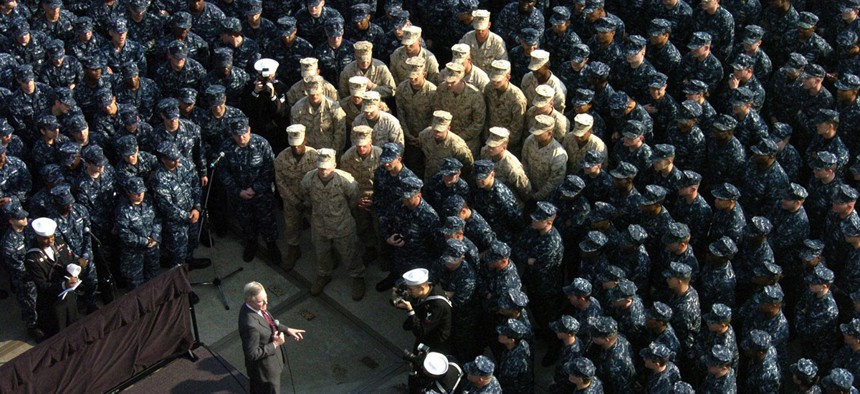
Ray Mabus speaks to sailors and Marines from units involved in Operation Tomodachi during an all-hands call in 2011. Seaman Apprentice Cale Hatch/Navy file photo
Navy Looks to Make Changes to Cold-War Personnel System
Armed with an innovative plan for promotions, Secretary Ray Mabus wants to sink industrial-age HR policies and rig his fleet for the 21st century.
Almost nothing in the U.S. military is older, and in more dire need of replacement, than the way it promotes its young officers and enlisted people. Codified in 1947, recertified in 1980, the system advances the vast majority not for performance or even potential, but for time served. “This is unheard of in the private sector,” wrote one Army Reserve brigadier general. “It rings loudly of institutionalizing mediocrity at best, and poisoning the pool of future senior leaders at worst.”
That general, who also happened to have been a former General Electric executive, is hardly alone in excoriating a system that gives top performers little reason to stick around. But literally decades of hand-wringing seem finally to be giving way to action. In March, Defense Secretary Ashton Carter championed a “Force of the Future” that would promote people “not on just when they joined but even more, based on their performance and their talent.”
Carter, who laid out an intriguing group of policy proposals in a speech at his own high school, seems to have been encouraged by various related experiments by the Navy, which in turn was spurred to act by a fall 2014 survey that found unexpectedly low morale among sailors. Today at 10 a.m. Washington time, Navy Secretary Ray Mabus is slated to unveil another spread of changes meant to entice and retain the best sailors of 2015 and beyond.
Among the moves are changes to various uniforms, physical-fitness standards, and other things meant to make life better for deckplate sailors, according to an early excerpt from Mabus’ speech released by Navy public affairs. Then there is this blockbuster:
“We are drafting a legislative proposal for FY ’17 to eliminate officer management by year group. A ‘golden’ path of inflexible career wickets, year groups, and promotion zones will no longer determine your success. Your performance will determine your timeline for promotion and increased responsibility.”
The excerpt also suggested that the Navy will create new ways for sailors to seek more education: “I will expand fully-funded, in-residence, graduate programs at civilian institutions...Having mastered your warfare specialty, there may come a time you wish to broaden your professional experience, which is why we will partner with Fortune 500 CEOs to create the ‘Secretary of the Navy Industry Tour.’”
Other changes are aimed at helping valued sailors balance service and family. Mabus said the Navy will propose legislation to double paid maternity leave, from six to 12 weeks, starting next year. It will also add staff at childcare facilities at three of the biggest Navy bases, allowing them to extend services two hours in the morning and evening.
In the excerpt, Mabus also reaffirms his commitment to open all operational jobs to women.
The Navy will be broadcasting the announcement on live video here.







